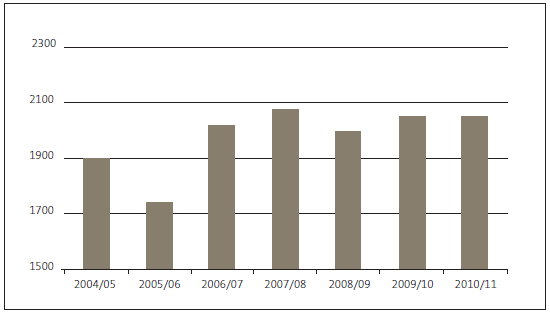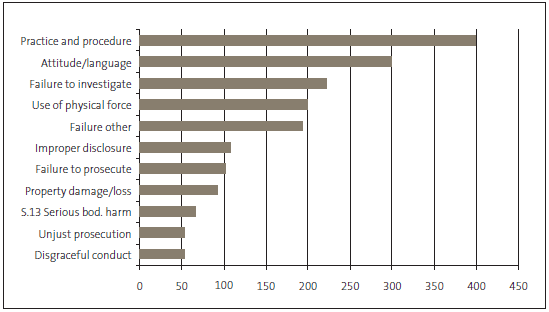Part 2: Complaints against the Police
2.1
The content and nature of complaints, by the public about police staff and by police staff about their colleagues, can provide useful information about public confidence in the Police and information about changes occurring within the Police. The Police need to manage complaints well and investigate them properly.
2.2
We expected that people, including police staff, would easily be able to make complaints about allegations of inappropriate behaviour by police officers and other police staff.
2.3
We also expected that the Police would investigate these complaints openly and fully, and report the necessary information back to the complainant.
Mixed progress on complaint-related activities since 2010
2.4
The Police's progress with complaint-related activities since our 2010 report has been mixed.
2.5
The availability of information about how to make a complaint against the Police has improved since our 2010 report.
2.6
In some instances, the Police may not be keeping complainants as well informed as necessary during the investigation of their complaints.
2.7
Police staff report on inappropriate behaviour by their colleagues. However, willingness to do this is variable. To an extent, it is influenced by perceptions of how other colleagues have been protected by management, and whether those colleagues have been on the receiving end of uncomfortable informal behaviour when they have made a complaint.
Details of the mixed progress on complaint-related activities
Complaint information is important
2.8
The Police have recognised that complaints against the Police, and the manner in which they are managed, were a theme of the Commission's findings.
2.9
The Independent Police Conduct Authority (IPCA) receives about 2000 complaints against the Police every year. IPCA decides which complaints need to be followed up (accepted complaints). Figure 2 shows the number of accepted complaints for each year from 2004/05 to 2010/11.
Figure 2
Number of complaints against the Police accepted by the Independent Police Conduct Authority, 2004/05 to 2010/11

Source: Independent Police Conduct Authority (2011), Annual Report 2010–2011, page 16.
2.10
The most common types of accepted complaints in 2010/11 were for practice and procedure, inappropriate attitude/language, failure to investigate, and use of physical force. Figure 3 shows the numbers of accepted complaints by type.
Figure 3
Most common types of complaint against the Police accepted by the Independent Police Conduct Authority in 2010/11

Source: Independent Police Conduct Authority (2011), Annual Report 2010–2011, page 19.
2.11
We saw evidence of two districts (not our fieldwork districts) systematically analysing complaints information. This analysis was largely of the total number of complaints and the ratio of complaints to staff members.
2.12
Complaints information had also been used in district early intervention systems.
Most members of the public know how to make a complaint about the Police
2.13
Information for the public on how to make complaints is available on the Police website and in pamphlets published by the Police and by the IPCA.
2.14
The Police have assessed public awareness of the processes for making a complaint against the Police in their 2009/10 and 2010/11 public satisfaction surveys. In 2010/11, 76% of respondents indicated that they were aware of a process for making a complaint against the Police. Similarly, 87% of respondents were confident that they could find out what to do if they wished to make a complaint. Women were significantly more likely than men to say that they were not confident they could find out what to do if they wished to make a complaint.
2.15
Representatives of sexual assault complainants told us that their clients and staff had mixed experiences with making complaints against the Police. We heard examples of excellent responses, particularly from more senior staff, but also examples of very poor practice. The representatives also told us that, in some rural communities, complaining about the Police is even more difficult because of the close-knit nature of the community.
2.16
The Police's standard practice for people visiting a police station to make a complaint is to refer them to the Senior Sergeant on duty in the station. Complaints also come through the IPCA. We were told that very few complaints come through the Crimestoppers anonymous telephone reporting service.
Complaints from police officers
2.17
We were made aware of several instances where police officers have raised issues about their colleagues' behaviour. This is supported by information that the Police have provided to us about the numbers of complaints that have been initiated within the Police since 2007. The numbers are relatively small compared with the total figures given in Figure 2. They range from 136 internally generated complaints in 2007 to 329 in 2011.
2.18
Moreover, individual police officers' willingness to report on wrongdoing by their colleagues appears to be variable. In part, it depends on their perceptions of how others were treated when they reported wrongdoing and who was involved. One interviewee referred to a culture of distrust about the consequences of raising issues or identifying that there might be a problem that needs resolving. Another referred to staff preferring to raise issues unofficially rather than formally.
2.19
There were some negative perceptions about how colleagues were treated when they reported issues with the behaviour of their colleagues. One of our interviewees said:
People won't speak up as they don't want to be singled out. The ones that do – good on them – have to be pretty driven if you have to sleep in the nest you're talking about.
2.20
Another interviewee said that they would be unwilling to report future incidents because "there's no way I'm going to get put through that". Another said that a friend "received stick" for "calling on our own". It appears that not much has changed since 2008 when a police document stated, "… this will influence those employees and others they come into contact with, as to whether they might report an unethical situation".
2.21
The Police acknowledge that it can be difficult protecting people who come forward to make complaints about colleagues.
2.22
However, other interviewees had contrary views. One said that not reporting the inappropriate actions of a colleague "would fall on my shoes. I don't want to ruin my career." Another said, "Don't stick up for someone else, as it will also come out in the wash." And another said that:
... the days of covering up about a colleague are well and truly gone … [I mean] are you willing to risk your job for someone else's stuff up?
Notification of serious complaints
2.23
The Police have a policy requiring the Commissioner of Police to be immediately notified of serious complaints about police staff. A serious complaint is defined by the Police as one of "such significant public interest it puts, or is likely to put, the Police's reputation at risk". These include "complaints against Police employees regarding incidents of a sexual nature".
2.24
There were 47 serious complaints notified to the Commissioner of Police in 2010 and 64 in 2011.
2.25
In at least one of the districts we visited, we were told that the District Commander was notified of serious complaints immediately, including complaints received when the District Commander was off duty.
2.26
The Police are also expected to report internal incidents of serious misconduct or serious neglect of duty to the IPCA. The definition of misconduct or serious neglect of duty is narrower and more technical than the definition of serious complaints required to be notified to the Commissioner of Police.
Investigating complaints
2.27
Regular liaison with the complainant or victims is a requirement in the Police's policy and procedure for investigating complaints and notifiable incidents. The IPCA has audited the Police's complaint and investigation files. It audited two files in July 2010, 20 files in November 2010, and 24 files in March 2011.
2.28
The audits identified some issues with communication with complainants. The 2010 work found that, in about one-third of cases, there was a three- to five-month delay in the Police making initial contact with the complainant. The 2011 work found that dates of contact with complainants were not always recorded and that, in some instances, it was not clear how contact had been made with the complainant.
2.29
We were provided with a few complaint files from one of the districts we visited. We did not find any fundamental errors in the process for managing those complaints.
2.30
We were interested in individual police officers' experiences of the investigation of complaints against them. Five interviewees recalled experiences that involved police officers not knowing that complaints had been made against them or the outcome of complaints against them, or both.
2.31
We accept that there is a wide variation in the seriousness of complaints and the resulting action. In our view, the Police should ensure that the person who is the subject of a complaint is kept appropriately informed about that complaint and its outcome. Keeping the subject appropriately informed is an expected part of the process that the Police are required to follow when investigating complaints.
2.32
The Police treat complaints that allege criminal wrongdoing by police officers as criminal investigations. This can involve investigation of police officers by other police officers from a different location. Some of the people we spoke with perceived that investigations of police officers were more rigorous than those for other persons. We have not audited criminal investigation files.
Improving complainants' experiences
2.33
The Police have a programme called Service First that focuses on the drivers of customer satisfaction in the different places of contact between the public and the Police. The initial focus has been on interactions at public counters in police stations. The leader of this programme within the Police is seen as the business owner of the Police's response to the Commission's recommendations R6 and R7:
- R6 – New Zealand Police should ensure that members of the public are able to access with relative ease information on the complaints process and on their rights if they do make a complaint against a member of the police; and
- R7 – New Zealand Police should undertake periodic surveys to determine public awareness of the processes for making a complaint against a member of the police or a police associate.
2.34
We were told that initial recruit training and Service First training includes training on managing complaints. Some of the people we interviewed told us they had received training in Service First. Districts are required to have Service First commitments in their district business plans.
2.35
Service First should lead to more focus on clients and victims when delivering services.
2.36
The Police have also noted that their separate Prevention First organisational operating strategy has a strong victim focus. The Police intend to continue to align their leadership and culture with this strategy.

